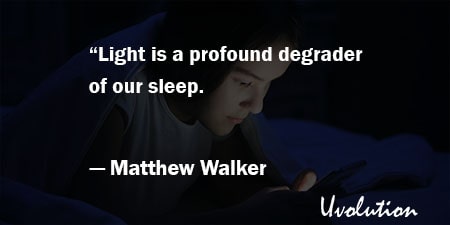Why We Sleep by Matthew Walker Summary
The Book in 1 Sentences
Why We Sleep: Unlocking the Power of Sleep and Dreams
“Two thirds of adults throughout all developed nations fail to obtain the recommended eight hours of nightly sleep. I doubt you’re surprised by this fact, but you may be surprised by the
consequences. Routinely sleeping less than six or seven hours a night demolishes your immune system, more than doubling your risk of cancer.” ~ Matthew Walker
So, this book is about why we sleep and HOW we should sleep.. Let's dive deeper in some of the big ideas of this great book.
10 BIG Ideas
4. Benefits of a Full Night of Sleep
6. Less Sleep = Heart Attack & Traffic Accidents
8. Sleep & Alzheimer’s Disease
Why We Sleep Book Summary
1. Sleep = Reset Your Brain
“A balanced diet and exercise are of vital importance, yes. But we now see sleep as the preeminent force in this health trinity. The physical and mental impairments caused by one night of bad sleep dwarf those caused by an equivalent absence of food or exercise.
It is difficult to imagine any other state—natural or medically manipulated—that affords a more powerful redressing physical and mental health at every level of analysis.
Based on a rich, new scientific understanding of sleep, we no longer have to ask what sleep is good for. Instead, we are now forced to wonder whether there are any biological functions that do not benefit by a good night’s sleep.
So far, the results of thousands of studies insist that no, there aren’t. Emerging from this research renaissance is an unequivocal message: sleep is the single most effective thing we can do to reset our brain and body health each day— Mother Nature’s best effort yet at contra-death.
Unfortunately, the real evidence that makes clear all the dangers that befall individuals and societies when sleep becomes short have not been clearly telegraphed to the public. It is the most glaring omission in the contemporary health conversation.
In response, this book is intended to serve as a scientifically accurate intervention addressing this unmet need, and what I hope is a fascinating journey of discovery. It aims to revise our
cultural appreciation of sleep, and reverse our neglect of it.”
2. Sleep is Universal
“Theodosius Dobzhansky once said, ‘nothing in biology makes sense except in light of evolution.’ For sleep, the illuminating answer turned out to be far earlier than anyone anticipated, and far more profound in ramification.
Without exception, every animal species studied to date sleeps, or engages in something remarkably like it. This includes insects, such as flies, bees, cockroaches, and scorpions; fish,
from small perch to the larger sharks; amphibians, such as frogs; and reptiles, such as turtles,
Komodo dragons, and chameleons. All have a bona fide sleep. Ascend the evolutionary ladder
further and we find all types of birds and mammals sleep: from shrews to parrots, kangaroos,
polar bears, bats, and, of course, we humans. Sleep is universal.”
“Humans are not sleeping the way nature intended. The number of sleep bouts, the duration of sleep, and when sleep occurs have all been comprehensively distorted by modernity.”
3. Baseline Resetting!
“Similarly problematic is baseline resetting. With chronic sleep restriction over months or
years, an individual will actually acclimate to their impaired performance, lower alertness, and
reduced energy levels. That low-level exhaustion becomes their accepted norm, or baseline.
Individuals fail to recognize how their perennial state of sleep efficiency has come to compromise their mental aptitude and physical vitality, including the slow accumulation of ill health. A link between the former and latter is rarely made in their mind.
Based on epidemiological studies of average sleep time, millions of individuals unwittingly spend years of their life in a sub-optimal state of psychological and physiological functioning, never maximizing their potential of mind or body due to their blind persistence in sleeping too little.
Sixty years of scientific research prevent me from accepting anyone who tells me that he or she can ‘get by on just four or five hours of sleep a night just fine.’”
“I will summarize this section by offering a discerning quote on the topic of sleep and emotion by the American entrepreneur E. Joseph Cossman: ‘The best bridge between despair and
hope is a good night’s sleep.’”
4. Benefits of a Full Night of Sleep
“AMAZING BREAKTHROUGH!
Scientists have discovered a revolutionary new treatment that makes you live longer. It enhances your memory and makes you more creative. It makes you look more attractive. It keeps you slim and lowers food cravings. It protects you from cancer and dementia.
It wards off colds and the flu. It lowers your risk of heart attacks and strokes, not to mention diabetes. You’ll even feel happier, less depressed, and less anxious. Are you interested?
While it may sound hyperbolic, nothing about this fictitious advertisement would be inaccurate.
If this were a drug, many people will be disbelieving. Those who were convinced would pay large sums of money for even the smallest dose. Should clinical trials back up the claims, share prices of the pharmaceutical company that invented the drug would skyrocket.
Of course, the ad is not describing some miracle new tincture or a cure-all wonder drug, but
rather the proven benefits of a full night of sleep. The evidence supporting these claims have
been documented in more than 17,000 well-scrutinized and scientific reports to date.
As for the prescription cost, well, there isn’t one. It’s free. Yet all too often, we shun the nightly invitations to receive our full dose of this all natural remedy–with terrible consequences.
Failed by the lack of public education, most of us do not realize how remarkable a panacea sleep truly is.”
5. Sleep is the Foundation
“I was once fond of saying, ‘Sleep is the third pillar of good health, alongside diet and exercise.’ I have changed my tune. Sleep is more than a pillar; it is the foundation on which the other two health bastions sit. Take away the bedrock of sleep, or weaken it just a little, and careful eating or physical exercise become less than effective, as we shall see.”
6. Less Sleep = Heart Attack & Traffic Accidents
“When communicating science to the general public in lectures or writing, I’m always wary
of bombarding an audience with never-ending mortality and morbidity statistics, lest they
themselves lose the will to live in front of me.
It is hard not to do so with such compelling masses of studies in the field of sleep deprivation. Often, however, a single astonishing result is all the people need to apprehend the point.
For cardiovascular health, I believe that finding comes from a ‘global experiment’ in which 1.5 billion people are forced to reduce their sleep by one hour or less for a single night each year. It is very likely that you have been part of this experiment, otherwise known as daylight savings time.
In the Northern Hemisphere, the switch to daylight savings time in March results in most people losing an hour of sleep opportunity.
Should you tabulate millions of daily hospital records, as researchers have done, you discover that this seemingly trivial sleep reduction comes with a frightening spike in heart attacks the following day.
Impressively, it works both ways. In the autumn within the Northern Hemisphere, when the clocks move forward and we gain an hour of sleep opportunity time, rates of heart attacks plummet the day after.
A similar rise-and-fall relationship can be seen with the number of traffic accidents, proving that the brain, by way of attention lapses and micro-sleeps, is just as sensitive as the heart to very small perturbations of sleep.
Most people think nothing of losing an hour of sleep for a single night, believing it to be
trivial and inconsequential.”
“There are many things that I hope readers take away from this book. This is one of the most important: if you are drowsy while driving, please, please stop.”
7. iPad & Melatonin Release
“A recent survey of over fifteen hundred American adults found that 90 percent of individuals
regularly used some form of portable electronic device 60 minutes or less before bedtime.
It has a very real impact on your melatonin release, and thus ability to time the onset of sleep.
One of the earliest studies found that using an iPad–an electronic tablet enriched with blue LED light–for two hours prior to bed blocked the otherwise rising levels of melatonin by a significant 23 percent.
More recent research goes several concerning steps further. Healthy adults lived for
a two-week period in a tightly controlled laboratory environment. The two-week period was split in half, containing two different experimental arms that everyone passed through:
(1) five nights of reading a book on an iPad for several hours before bed (no other iPad uses, such as email or Internet, were allowed), and
(2) five nights of reading a printed paper book for several hours before bed, with the two conditions randomized in terms of which the participants experience first or second.
Compared to reading a printed book reading on an iPad suppressed melatonin released by over 50% at night. Indeed, iPad reading delayed the rise of melatonin by up to three hours, relative to the natural rising the same individuals experience when reading a printed book.
When reading on the iPad, their melatonin peak, and thus instruction to sleep, did not occur until the early morning hours, rather than before midnight.
Unsurprisingly, individuals took longer to fall asleep after iPad reading relative to print-copy reading.”
8. Sleep & Alzheimer’s Disease
“Insufficient sleep is only one among several risk factors associated with Alzheimer’s disease. Sleep alone will not be the magic bullet that eradicates dementia.
Nevertheless, prioritizing sleep across the lifespan is clearly becoming significant factor for
lowering Alzheimer’s disease risk.”
9. 3,400,000 Years of Evolution
“Within the space of a mere hundred years, human beings have abandoned their biologically
mandated need for adequate sleep–one that evolution spent 3,400,000 years perfecting in-service of life support functions.
As a result, the decimation of sleep throughout industrialized nations is having a catastrophic impact on our health, our life expectancy, our safety, our productivity, and the education of our children.
This silent sleep loss epidemic is the greatest public health challenge we face in the twenty-first-century in developed nations.
If we wish to avoid the suffocating effects of sleep neglect, the premature death it inflicts, and the sickening health it invites, a radical shift in our personal, cultural, professional, and societal appreciation of sleep must occur.
I believe it is time for us to reclaim our right to a full night of sleep, without embarrassment or
the damaging stigma of laziness.
In doing so, we can be reunited with that most powerful elixir of wellness and vitality, dispensed through every conceivable biological pathway.
Then we may remember what it feels like to be truly awake during the day, infused with the very deepest plenitude of being.”
10. How to Have a Good Night Sleep?
Matthew shares these 12 tips from the National Institute for Health.
Tip #1 “Stick to a sleep schedule. Go to bed and wake up at the same time each day. ... Set
an alarm for bedtime. Often we set an alarm for when it’s time to wake up but fail to do so for
when it’s time to go to sleep. If there is only one piece of advice you remember and take from
these 12 tips, this should be it.”
“2. Exercise is great, but not too late in the day. Try to exercise at least 30 minutes on most days but no later than two or three hours before your bedtime.”
“3) Avoid caffeine and nicotine.”
“4) avoid alcoholic drinks before bed.”
"5) Avoid large meals and beverages late at night."
"6) If possible, avoid medicines that delay or disrupt your sleep."
"7) Don’t take naps after 3 p.m."
"8) Relax before bed. Don’t overschedule your day so that no time is left for unwinding. A relaxing activity, such as reading or listening to music, should be part of your bedtime ritual."
"9) Take a hot bath before bed."
"10) Have a good sleeping environment. Get rid of anything in your bedroom that might distract you from sleep, such as noises, bright lights, an uncomfortable bed, or warm temperatures."
"11) Have the right sunlight exposure."
"12) Don’t lie in bed awake. "
Read more details here.
That was my QUICK summary of the great book Why We Sleep by Matthew Walker. If you’re interested, get your copy. There is a HUGE amount of life-changing ideas in this book, and we’ve only touched on a tiny bit of it.
Buy The Book: Why We Sleep by Matthew Walker

GET Blinkist 7 Days FREE Trial
3000+ Book Summaries
(Audio and Text)






